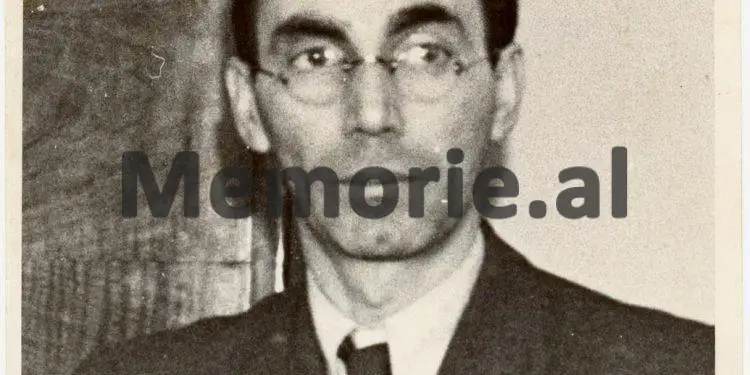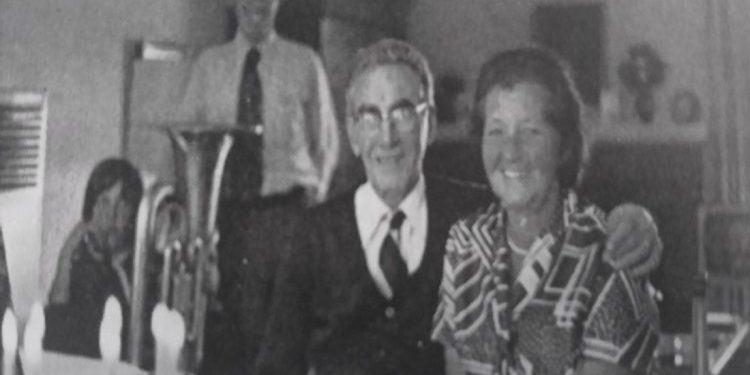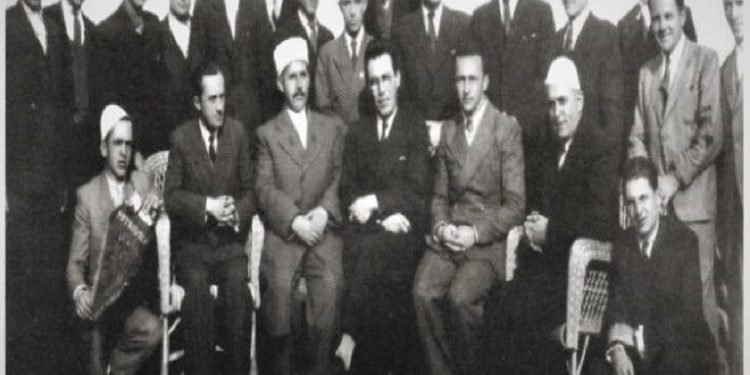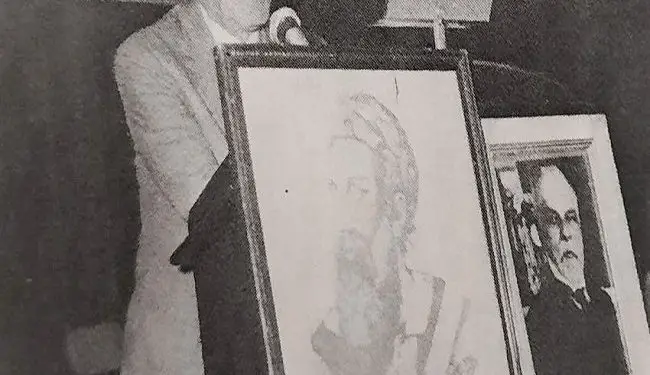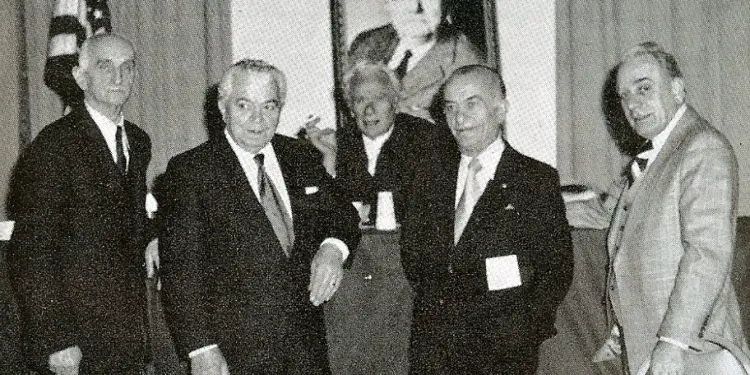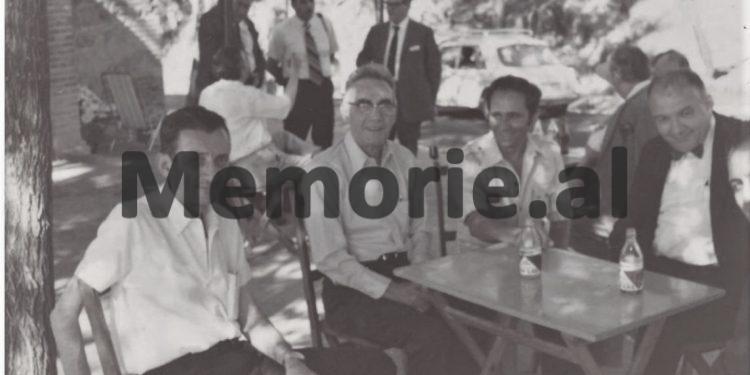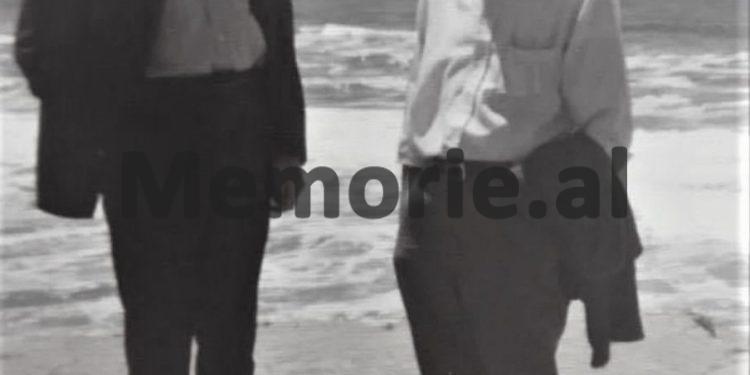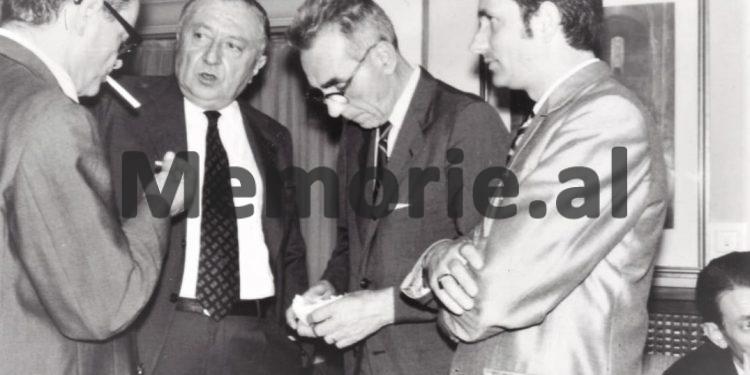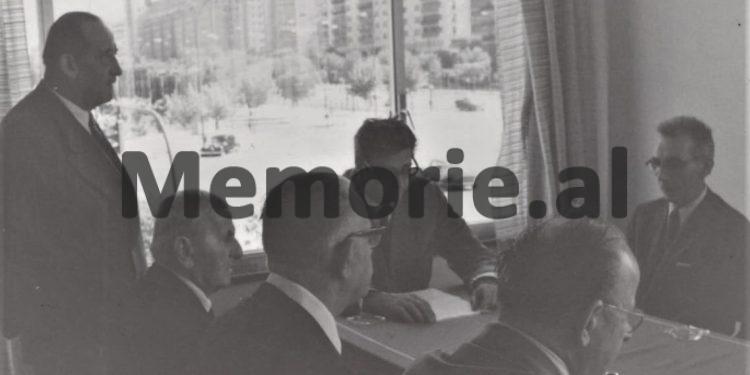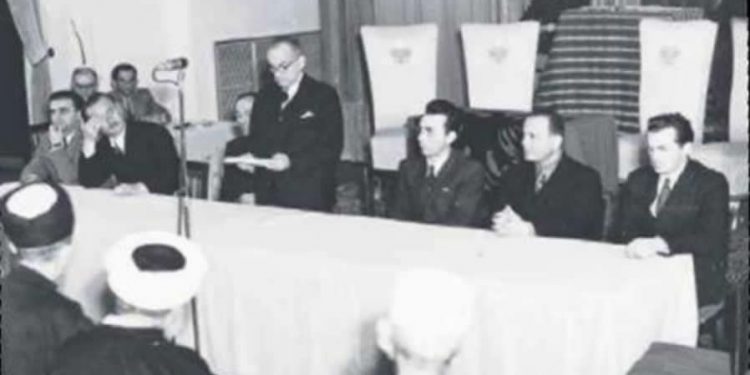By Idriz Lamaj
Part twenty-one
From the works of the apostles of ethnic Albania
Xhafer Deva
In light of his own letters and other diaspora revelations
Preface
Memorie.al/ Probably like many others, I often browse letters with my friends and associates, who are no longer in this life. Browsing through them, for a moment unfolds memories that it seems to me that some of them can serve our history. Then, I return to the awareness of the current difficult situation in the ethnic homeland, caused by the quadruple of Albanian politics, I say to myself: “What can my memories of others or the letters of the people of dead? ”
Without being the ominous instigator of pessimism, thinking as always of a better future, I return to my obligations to my friends, and as an icy observer of time, without any claim of historical service, when I am given the opportunity of publication, write what I have in mind, always based on their writings and letters. This principle is also followed in this book about Xhafer Deva. I knew Xhafer Deva in person; we exchanged visits and had a strong correspondence.
I spent days off at his house and inherited all of Xhafer Deva’s correspondence with Rexhep Krasniqi, his closest friend, for more than 40 years. After many years, I talked on the phone with Mrs. Deva’s daughter and son-in-law. In the conversation going on, taking advantage of the old friendship, I asked about his letters and they informed me that it was all Qefali Hamdia, a friend of their family.
In June of last year (2001) I went to Kenosha, Wisconsin, a guest of Qefali Hamdia, to look at Xhafer Deva’s correspondence, which Mrs. Deva sent her years ago, when she, due to her advanced age, was closed his house to go to the house of his 5th daughter and son-in-law, Mrs. Burgl Dagmar and Rev. Dennis Logie.
After reading the bulk of the letters, in the languages I knew, I took with me more than a thousand pages of his correspondence, covering a period of over 30 years, 1945 – 1978. Xhafer Deva spoke and wrote seven – eight languages. His correspondence is: Albanian, English, German, Italian, French, Turkish and Serbian. Xhafer Deva’s letters and writings, with the exception of those in Old Turkish and Serbian in Cyrillic, are mostly typewritten, well-kept, and alphabetically arranged, with the persons he dealt with.
That includes his family letters. He carefully kept a copy of every letter he sent and every letter he received. Mrs. Oswalda Deva, daughter Burgl, son-in-law Dennis Logie and Mr. Qefali Hamdia with family, expressed his heartfelt thanks for the trust they gave me. With special gratitude I recall here the help given to me by my brothers – Captain Nue Gjomarkaj and Nikoll Gjomarkaj, in the preparation of one of the most important chapters of this book.
Kapidan Nou, in addition to making available the subject on Xhafer Deva’s relations with the ‘Independent National Bloc’ and sending paratroopers to Albania and Kosovo, reviewed with me each document of that period, and we formulated the text in the form of a conversation; while Nicholas, deciphered the letters, transcribed and translated from Italian, the unpublished materials to date, which were published in this chapter.
Continues from the last number
Xhafer Deva’s life and activity in exile
– Kosovo in the time of Ethnic Albania –
Xhafer Deva in the light of his own letters
In the United States.
He later leaves the camp and joins them. They immediately decide to cross the border into Greece and arrive in Thessaloniki from where it is transferred to Llavrion in Athens. Determined to contribute to the common Albanian cause, he joins a group of Albanians in training for operations in Albania, which were led by the National Committee “Free Albania”. Thus, in those operations which lasted a year and ended unsuccessfully, Kaloshi won the admiration of his comrades and the respect of his superiors. In 1956 he moved to South Milwaukee, where he worked for two years in a factory, and through his friends he brought his brother Sakib and together they bought a restaurant in Milwaukee, where they worked day and night until 1967.
With the sale of the restaurant, he buys the Dayton Hotel in Kenosha, Wisconsin. During this time he made several trips to Istanbul and arranged the behavior of his immediate family: the lady, son Qefali and daughter Hyrije. For the first time, after much suffering, Kaloshi settles down well at the Dayton Hotel and begins to enjoy a quiet life. With hard work and extraordinarily positive qualities, they bought two houses. He later bought the Randolph Hotel and the Saratoga Club in Milwaukee. With the development of the trade, he also brings his other brother Xhavid. Kaloshi modestly claimed that he had joined the ranks of the ‘Second League of Prizren’ as a simple member at the age of 17, where he had joined the volunteer forces in his homeland. In exile he was one of the League’s most prominent supporters. In 1971 he was elected its vice president. This short biographical summary of him was sent to me by Xhafer Deva in the form of notes on the occasion of Kaloshi’s murder and was published in the newspaper “Lidhja e Prizrenit”, January – July 1974.
Hysen Terpeza
In Deva’s correspondence, there is a folder of letters with Hysen Terpeza, a well-known fighter in Kosovo and vice-president of the ‘League of Prizren in Exile’, after 1962. Deva in his letters with Terpeza, is reserved; they belong only to the official character of the meaning as vice-president of the ‘League’. The reason that Deva kept reserves in correspondence with him is explained in various letters sent to his friends, with whom he did not keep reserves in correspondence. From the beginning, he considers Terpeza to be a politically shaky man and a man who was easily used by others. Hysen Terpeza often writes to Xhafer Deva, but very rarely, compared to other leaders of the League, receives letters from him.
To his letter, regarding the request for the expulsion of Dem Ali Pozhari from the ranks of the ‘League’, Deva responds briefly: “Mr. Hysen, the chairman of the ‘League’, like all other chairmen of political parties or organizations in exile, has no authority to charge, dismiss or expel members of the organization he heads. Appointments, dismissals and dismissals are made by the Executive Committee and approved by the Chairman. Regarding Dem Ali Pozhari and your request for his immediate expulsion from the ‘League’, I have this to say: Dem Alia has dismissed himself from the ‘League’ and there is no need for his expulsion on our part. He went to Tirana, without consulting us, but still went like men, just as Dem Alia could. Went the day for the sun. I have a better understanding of such an action, than for many others who go sometimes to Brussels, sometimes to Istanbul to meet their family members from Kosovo, who are accompanied by people from the U.D.B. To me, the chapter with Demen closes with these words. You, if you want to exclude him, have to convene the Executive Committee, and of course, I approve the decision of the Committee “. (This letter from Deva, sent to Hysen Terpeza does not have a date).
Meanwhile, the treasurer of the League, his friend Hysen Pllana, Deva writes about Terpeza: “Hyseni is a fighter but, he had misfortunes like most of the heroes of Kosovo, having neither school nor craft. Unable to support himself with any job that gives him satisfaction, he has remained poor from an economic point of view. His name as a warrior has been used by others. Therefore he moves his thoughts, sometimes to one side, sometimes to another. He has done this since the camps of Greece, sometimes with Legality and sometimes against him. We have to leave Hysen as he is. It is not good for us to deal with his personal problems, or to attach importance to his ostensibly political actions. As vice-president of the League, we must respect him until we choose him… “! (Paragraph from a letter from Deva sent to Hysen Plana, August 7, 1969). Hysen Terpeza, often, with the encouragement and help of others, in writing, issued open letters against Xhafer Deva, Dr. Rexhep Krasniqi and the Committee “Free Albania”. Based on the silence of the people he criticized, few took his “controversies” seriously. Fighter during the Second World War, Hysen Terpeza enjoyed a special respect in the popular masses of Albanian political emigration.
Ismet Berisha
Ismet Berisha comes from a well-known patriotic family of the Dukagjini Plain. His grandfather, Sadik Ramë Gjurgjeviku, is one of the prominent leaders of Kosovo, who along with Bajram Curri and other Kosovar princes, made an outstanding contribution to the efforts for the liberation and unification of Kosovo with Albania. His son, Ukë Sadiku, Ismet’s father, was one of the well-known fighters during the Second World War, and an unwavering believer in the ideals of the ‘League of Prizren’. For his militant stance, he was shot by the communists in Pristina in 1947, along with patriots Ajet Gërgur, Osman Bunjaku and Gjon Serreqi. Ismet Berisha was born in Shijak, Albania, in 1933. He immigrated to the USA in 1960 and immediately came in contact with other Kosovars, friends of his father and grandfather, such as Mehmet Agë Rashkoci, etc. Ismet’s older brother, Skender, was sentenced to 17 years in prison in Yugoslavia. During the years 1945, 1946, 1947, his entire family was imprisoned. Ismet Berisha is one of the first organizers of the ‘League of Prizren in Exile’. As early as 1962, he asked Rexhep Krasniqi to intervene with Deva, to accept the presidency of the League.
In some letters, Deva expresses dissatisfaction with Ismet’s attitudes. Viewed from the objective angle, Deva’s dissatisfaction is a bit excessive. Deva lived away from Albanian political crowds in exile (away from New York), and away from the organization she headed. Berisha was among them, not to mention in their whirlpool. As a young man with inexhaustible energy, he needed others, and often clashed with himself, let alone with Xhafer Deva. In order to bring as many people around the ‘League’ as possible, Ismet had to adapt to the developments of the time and to the people, who probably did not like him either. In the Second Congress, he accepted responsibility for publishing the statement in the newspaper “Dielli” and withdrew from the Congress hall, making it clear that he would remain a loyal member of the ‘League’. Berisha had the full support of Kalosh Hamdis and many new members of the League. Despite Deva’s complaints, Ismet never wrote against him. On the contrary, he persistently defended Xhafer Deva’s overall political strategy, and tried to quell disagreements within the organization.
Returned to the previous post, at the request of Kalosh Hamdis and some other friends. They saw Ismet as the only energetic person who could coordinate the League’s activities in New York. After the death of Xhafer Deva, the ‘League’ made changes to the Statute and often wavered in its political positions, as a result of dramatic changes of time and excessive expansion in cooperation with others. With his personal efforts, Ismet Berisha kept alive the name and mission of the League and carried out various activities on behalf of this patriotic organization. Even today, after 40 years, he has managed to bring around the ‘League’ a new element of intellectuals, coming recently from Kosovo and Albania. Since 1998, the League has opened an office in the Bronx, New York. During the recent fighting in Kosovo, this organization has made a valuable contribution to the collection of material aid and to raising its political voice. From the reorganization of the ‘League of Prizren in Exile’, until Deva’s death, with a brief exception after the Second Congress, Ismet Berisha was the General Secretary of this organization. Deva’s correspondence with Berisha is rich.
Shemsedin Vendresha
Shemsedin Vendresha was one of the talented journalists of his time and knew several languages: French, German, Italian, and Turkish. Born and raised in Skopje during World War II, he engaged in various activities, first as director of Radio Prishtina based in Prishtina, and later as a member of the Committee of the Military Organization of the Nationalist Youth of Prishtina for the Protection of This organization was founded in 1944, with the encouragement and support of Xhafer Deva, who, at that time, was the Chairman of the ‘Second League of Prizren’. He helped to publish the Legality newspaper, Atdheu, and later became the press director of the League. The Prizren League, edited by him and controlled by Xhafer Deva, is considered a newspaper. Deva’s correspondence with Vendresha is limited; he suspected that Shemsedin Vendresha had connections with Tirana government officials in the West.
On this issue, Deva asks for information from his friend in Istanbul, Tahir Kolgjini, who responds: “As for Shemsedin Vendreshen, I can only give some announcements, which, then I evaluate myself.
Shemsedin, with whom I have collaborated for many years on issues I have had including my goals – national – is ambitious in position. He, when it’s his turn, can step on the corpse of his collaborator, to shoot in an enviable position. With all this, generosity is not lacking. Not only; but does not spare itself when it comes to any national activity. It is a fact. Of course like everyone else, he also likes to be mentioned.
He has been a real anti-communist before. Later, with the place here, enter into relationships as deep. Then, he met with some red Albanian officials and caused the trust to shake. On top of that he fell far short in economic terms and started with suffered. A girl of her own in Albania, she had progressed and was distinguished as an artist – it seems to me: soprano. -She, I believe, relying on the artistic value of her daughter, one day she tells me, she thinks of going to Albania, because she could not live here. In this way he asked me his opinion. I replied: “You still did not know communism. You helped the anti-communists in Kosovo. You spoke against communism on the radio in Prishtina, on the radio in Skopje and in the radio in Vienna. You published the anti-communist newspaper, Vardar in Istanbul. Not that you yourself wrote against communism; but you have also published articles by me and other anti-communists. So, Tirana knows all this. To you, to bring out the soul in milligrams. ” He repented and did not go
After much suffering, Legality took him to New York, to hand over the publication of the notebook ‘Homeland’. Before he left, I ordered him, telling him to look after his own work and livelihood; not to quarrel in their quarrel, which they may have with one another. However, she began to covet higher and higher. Get in the middle of the waves. And with the death of Nuçi Kota, Selim Damani and his family kicked him and kicked him like a football.
There is no need to describe life in the ‘League of Prizren’. You know yourself.
As for those who were executed in Ankara, I do not know if there was any cooperation with them. I do not believe. She has been in New York for many years, leaving Istanbul. At that time, there was not enough work to do, they needed Shemseddin. Now, he combines these points himself. He is a man who can be used, so he can cooperate with him on two conditions:
By keeping the brake strong and b) by not handing over important secrets “. (Letter from Tahir Kolgjini to Deva from Istanbul, 29/4/1975.
Shemsedin Vendresha was one of the strongest anti-Yugoslav pens. Regardless of his attitude towards the Tirana government, he did not make the slightest compromise with Belgrade. Turkey during the Cold War was a country hit by the subversive actions of international communism. The Turkish government, from time to time, mercilessly punished the internal communist movements. Even the communist regime of Tirana, developed some propaganda in that country, taking advantage of the wise political treatment given by the Turkish government to Albanian diplomats in their country. After the execution of a group of five people, from the middle of 1962, the Turkish press mentions the complication of the Tirana government. Memorie.al




